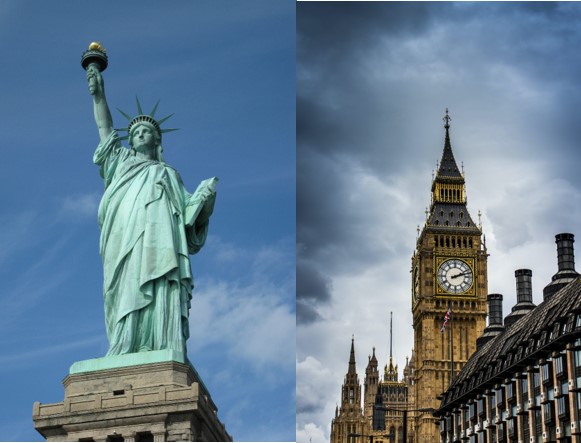
I learned this today. The British and American accents are different because the UK accents dropped a few things that the US kept.
It is obviously difficult to generalize about UK and US accents because there are wildly different accents within each country. So, why do accents form?
Accents form because of the history and the culture of a region. For example, within the UK, different accents spring up because of the people that settled there and the languages they speak. Britain was originally a country where people generally spoke Celtic. The Romans came in 55 BC and brought Latin. They settled as far as Scotland. Then Germanic tribes (the Jutes, the Saxons, and the Angles) came in about 400 AD. They pushed Celtic speakers into Wales, Cumbria, and Cornwall. The Welsh language is a Celtic language and this explains the accents in these areas. The Germanic tribes came from Engla land and they spoke Englisch, which became early English. They lived in mostly southern areas. Then St. Augustine brought Christian missionaries and they introduced Latin again, followed by the Vikings in the 8th century. They conquered most of the northern half of Britain and that accounts for those accents. Then the Normans came in 1066 and introduced French. And these, coupled with the identity of each town, account for all of the accents in the UK.
Australian accents started because most of the Europeans who went out there were from London and the surrounding area. However, that accent has changed to become the huge variety of accents all over Australia. Immigrants from different countries added their touch to the accent and local identity has done the rest.
Canadian accents came about because the majority of immigrants to it came from southern Britain and Ireland. Then, during the American Revolution, 45,000 people who were loyal to the British crown fled to Canada, taking their accent with them. This mixed with the British and Irish accents to create the Canadian accent. Then, of course, over the following two hundred years, local accents have evolved and been affected by the immigrants who have moved there. For example, the Newfoundland accent was shaped by the majority of immigrants who came from southwestern England and southeastern Ireland.
The American accents came about because of the Europeans that settled the different regions. There were a mixture of Spanish, French, Dutch, German, Swedish, British, and Irish people. After English became the dominant language in America, each of these groups spoke English with their own local accent, and this amalgamated to make the local accents. Then, the Native American languages and accents were added in certain areas.
So, the easy answer to the question of why British and American accents sound different is that they were never the same. The original settlers from Britain to America took their local accents with them, but, by the War of Independence, so many other nationalities had added their accents into the mix that the American accent was already considerably different to the British accent.
If we just look at the accent of the original settlers and the accent of modern Britain, then they have obviously changed because accents evolve and when they are geographically separated, they evolve in different directions.
There are possibly two reasons why the original British accent of settlers in America and the modern American accent are different. One is rhoticity and the other is the movement of the economy.
Rohoticity is the pronunciation of the rhotic consonant /r/. British English has become a non-rhotic accent while American English is a rhotic accent. This means that in British English, the /r/ sound after a vowel is generally not pronounced. As in “car” or “hard”. This trend started in the 15th century, and by the 17th century the /r/ sound is still there, but weak. By 1770, pronunciation without the /r/ was very common and during the War of Independence, Americans visiting the UK noticed the difference. By the early 19th century, the change was complete. This lack of an /r/ sound is probably one of the biggest differences between the two accents.
The second reason is the movement of the economic centers of wealth. When America was first colonized and up to the Civil War, almost, a lot of money was held in plantations. From the early days of America, the wealthy were plantation owners and they used a form of received pronunciation to differentiate themselves from regular people. When the South lost the Civil War, the economic centers shifted to the North and to the industrial cities. It became easier for regular people to make money and for regular accents to become more noticed. As this change took place, the RP, “British” accent faded away and more local “American” accents took over.
There are many more reasons why the accents in the two countries sound different, but these are two that I think are important. And this is what I learned today.
If you read this far, I would appreciate a like and a follow.
Sources:
https://www.mentalfloss.com/article/29761/when-did-americans-lose-their-british-accents
https://www.sciencefocus.com/the-human-body/why-do-people-have-accents/
https://www.ef.com/wwen/blog/language/why-us-and-uk-english-sound-so-different/
https://www.vice.com/en/article/v747m9/why-the-uk-has-so-many-accents
https://www.bbc.com/culture/article/20160921-where-does-canadas-accent-come-from
https://www.eurocentres.com/blog/where-did-the-australian-accent-come-from
https://en.wikipedia.org/wiki/Rhoticity_in_English
https://en.wikipedia.org/wiki/Great_Vowel_Shift
